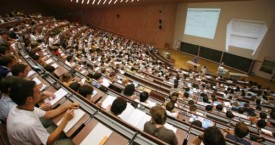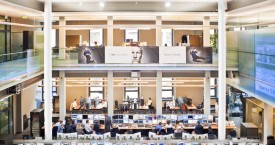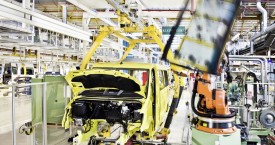Die UN Agenda 2030 fordert nachhaltiges Wirtschaften in mehreren Nachhaltigkeits-Zielen der Agenda:
Ziel 8: dauerhaftes, inklusives und nachhaltiges Wirtschaftswachstum, produktive Vollbeschäftigung und menschenwürdige Arbeit für alle.
Ziel 9: eine belastbare Infrastruktur aufbauen, inklusive und nachhaltige Industrialisierung versorgen und Innovationen unterstützen.
Diese Ziele sind verbunden mit dem Ziel 12: für nachhaltige Konsum und Produktions Muster sorgen sowie Ziel 4: inklusive, gerechte und hochwertige Bildung gewährleisten und Möglichkeiten des lebenslangen Lernens für alle fördern.
Das Modell der sozialen Marktwirtschaft, dass das wirtschaftliche Leitbild der europäischen Union ist, umfasst die wesentlichen Ziele der UN Agenda 2030. Sie sind Ausdruck nachhaltigen Wirtschaftens . Deshalb ist Corporate Social Responsibility Teil der Unternehmenskultur der meisten Betriebe.
Seit 2017 muss die EU-Richtlinie über die Berichterstattung zur Offenlegung nicht-finanzieller Informationen für mittlere und größere Unternehmen durch nationale Gesetze umgesetzt werden. Um für die Unternehmen diese Verpflichtung zu erleichtern, hat der Rat für Nachhaltige Entwicklung den Deutschen Nachhaltigkeitskodex entwickelt. Mit der Anwendung des Nachhaltigkeitskodexs können die gesetzlichen Anforderungen erfüllt und zugleich ein Mehrwert für das Unternehmen bei der Erarbeitung des Nachhaltigkeits-Bericht erreicht werden.
Eine zentrale Herausforderung für Politik, Gesellschaft und Wirtschaft ist die dynamische Entwicklung der Digitalisierung, die zugleich Treiber der Globalisierung ist. Arbeitsplätze, Arbeitsstrukturen, Arbeitsinhalte, aber auch Wertschöpfungsketten und Steuereinnahmen verändern sich erheblich. Automation, Robotic und selbstlernende Systeme Dank künstlicher Intelligenz haben kaum vorhersehbare Folgen für unsere Arbeitswelt, die beruflichen Entwicklungen und das Bildungssystem. Umso wichtiger ist es, dass sich jede Kommune diesen Herausforderungen klar wird und seine Potenziale und Gestaltungsmöglichkeiten konsequent nutzt.
Wirtschaftsförderung war stets für Oberbürgermeister Wolfgang Schuster Chefsache, denn eine starke kommunale Wirtschaft ist die Grundlage für Arbeitsplätze, soziale Leistungen, ökologische Qualität und eine hohe Lebensqualität für alle.
In Stuttgart lässt es sich besonders gut leben, investieren und arbeiten, da hier Technologie, Talent und Toleranz zusammenkommen. Diese drei „T“ sind unser Motor für Zukunftsfähigkeit. Bewegt wird dieser Motor von unseren Bürgerinnen und Bürgern aus über 170 Nationen. Sie machen Stuttgart zum Zentrum einer der leistungsfähigsten Wirtschaftsregionen Europas: forschungsstark, innovativ, lebenswert. Einem Ort, an dem das Wissen für morgen entsteht. Einem Zentrum für die Mobilität der nächsten Generation. Einer Stadt, die Menschen aus der ganzen Welt anzieht. Deshalb ist Stuttgart ein Motor für die Leistungen vieler Persönlichkeiten.
STUTTGART: MEIN MOTOR
»Unsere Wurzeln sind schwäbisch. Mit Pioniergeist, faszinierenden Produkten, hervorragenden Wachstumschancen und ausgezeichneten Ingenieuren werden wir das vor uns liegende Zeitalter nachhaltiger Mobilität an führender Position mitgestalten.«
>>Dr. Dieter Zetsche, Vorstandsvorsitzender der Daimler AG
»In der Region Stuttgart werden jährlich rund 3.600 Patente angemeldet. Gut für Stuttgart. Gut für uns.«
>>Dr. phil. Nicola Leibinger-Kammüller, Vorsitzende der Geschäftsführung TRUMPF Gruppe
»Die Welt wird grüner. Und vom Grossraum Stuttgart aus liefern mehr als 8.800 Entwickler die dafür notwendigen Geistesblitze und Technologien.«
>>Franz Fehrenbach, Aufsichtsratsvorsitzender der Robert Bosch GmbH
»Eine Stadt mit herrlich viel Grün. Hier kommt man ganz automatisch auf die Idee, Gebäude zu entwickeln, die 100 % recycelbar sind.«
>>Prof. Dr.-Ing. Werner Sobek, Gründer der Werner Sobek Firmengruppe für Design, Engineering und Green Technologies im Bauwesen
»In Stuttgart forschen wir am Fortschritt und am Erhalt der Erde. Ich bin stolz, einen Beitrag für eine umweltfreundliche Zukunft zu leisten.«
>>Christoph Arndt, Wissenschaftler beim DLR Stuttgart
»Die Kreativwirtschaft fährt hier permanent auf der Überholspur.«
>>Ulrich Wegenast, künstlerischer Geschäftsführer des Internationalen Trickfilm-Festivals (ITFS)
»Es ist nicht wichtig, wo jemand herkommt. Es ist nur wichtig, einen Platz zu finden, an dem man sein Können und sein Talent bis zur Perfektion vorantreiben kann.«
>>Sue Jin Kang, Erste Solistin des weltbekannten Stuttgarter Balletts
Einige Zahlen und Fakten
- 18 Hochschulen und Universitäten
- 67 Forschungs- und Transferzentren der Steinbeiss -Stiftung
- 8,4 Millionen Bücher in über 120 Bibliotheken
- 2,6 Millionen Einwohner in der Region Stuttgart
- 5,3 Millionen Einwohner in der Metropol-Region
- 24 % der Bewohner unter 25 Jahren
- 170 Nationalitäten
- über 120 Sprachen werden gesprochen
- 40 % der Stuttgarter mit Migrationshintergrund
- mit 22 % deutschlandweit höchster Anteil ausländischer Studenten
- 335 Partnerhochschulen in 47 Ländern weltweit
– Nachhaltiges Wirtschaftswachstum –
Aufgrund einer Kompetenzfeldanalyse ergeben sich für Stuttgart besondere Chancen für nachhaltiges Wachstum in drei Aufgabenfeldern:
1. Nachhaltige Technologien,
vor allem im Bereich Mobilität und Bauen, um zur Energiewende, das heißt zum Post-Öl- und Post-Nuklear-Zeitalter beizutragen.
2. Wissen für Morgen
mit einem breit gefächerten Bildungsangebot für lebenslanges Lernen, gezielter Förderung von Talenten und Unterstützung von Wissenschaft und Forschung für technologische Nachhaltigkeit.
3. Stadt(er)leben
mit der Weiterentwicklung des Tourismus, der lokalen und regionalen Gastronomie, des Einzelhandels, von Sport- und Kulturveranstaltungen, Freizeitangeboten und Gesundheitsdienstleistungen.
The UN Agenda 2030 urges for sustainable economic activities in several of its Sustainable Development Goals:
Goal No. 8: enduring, inclusive and sustainable economic growth, productive full employment and humane jobs for everyone.
Goal No. 9: building of a resilient infrastructure, supporting an inclusive and sustainable industrialization and promoting innovation.
These goals are linked to goal 12– to assure sustainable consumption and production -, as well as with goal 4: to guarantee the right to inclusive, just and high-quality education and the opportunity for a life-long learning for all.
Social market economy, which is the economic model of the EU, encompasses these fundamental goals of the UN Agenda 2030. They are the very expressions of sustainable economic activities. That is why corporate social responsibility is a part of the business culture of most enterprises.
Since 2017, the EU-guidelines on non-financial reporting for middle-sized and large enterprises must be implemented through national legislation. To make these obligations for enterprises easier, the Council on Sustainable Development issued the German Sustainability Codex. With the help of the German Sustainability Codex, enterprises can fulfill their legal obligations and also create added value for themselves in the process of elaborating the requirements of the codex.
One of the key challenges for politics, society and economy is the dynamic development of digitalization, which is the driver of globalization at the same time. Work places, work structures, job contents, but also value chains and tax revenues are changing substantially. Automation, robotics and self-learning systems due to artificial intelligence have unforeseeable consequences for our work environment, professional developments and educational systems. It is therefore all the more important, that each municipality is aware of these challenges and uses consistently its potentials and opportunities.
Mayor Wolfgang Schuster had declared economic promotion to be a top priority, because a strong local economy is the base for employment, social benefits, ecological quality and high quality of life for everyone.
Stuttgart is a great place to live, invest and work because it is a city where technology, talent and tolerance cross paths. These three „T“s are the motor that drives our ability to succeed in the future. This motor is in turn fuelled by our citizens from over 170 nations. They make Stuttgart the centre of one of the most high-performing economic regions in Europe – one that is strong in research, innovation and quality of life. A place where the ideas of tomorrow are created; a centre for the mobility of the next generation; a city that attracts people from around the world.
Therefore Stuttgart is the motor for the high performances of many important people.
STUTTGART: MY MOTOR
»Our roots are Swabian. With our pioneering spirit, fascinating products, outstanding growth potential and extraordinary engineers, we will help to shape sustainable mobility in the days to come from a leading position.«
>>Dr . Dieter Zetsche, Chairman of the Board of Daimler AG
»About 3,600 patents are registered every year in the Stuttgart region. Good for Stuttgart. Good for us.«
>>Dr. phil. Nicola Leibinger-Kammüller, President of the TRUMPF Group
»The world is becoming greener. And more than 8,800 developers from the Greater Stuttgart Area are delivering the inspiration and technology that are needed for this.«
>>Franz Fehrenbach, Chairman of the Supervisory Board of Robert Bosch GmbH
»A city with an exquisite amount of green. Here, the idea of developing buildings that are 100 % recyclable is quite automatic.«
>>Prof. Dr .-Ing. Werner Sobek, Founder of the Werner Sobek Group
of Companies for Design, Engineering and Green Technologies in Building
»In Stuttgart we are researching progress and preservation of the planet. I am proud to be making a contribution to a greener future.«
>>Christoph Arndt, Research Scientist at DLR Stuttgart
»The creative industry is permanently in the fast lane here.«
>>Ulrich Wegenast, Artistic Managing Director of the Stuttgart Festival of Animated Film
»Where one comes from is not important. It is only important to find somewhere to develop one’s ability and talent to perfection.«
>>Sue Jin Kang, First Soloist of the world-famous Stuttgart Ballet
Some facts and figures
- 18 universities and academies
- 67 research and transfer centres under the Steinbeis Foundation
- 8.4 million books in more than 120 libraries
- 2.6 million inhabitants in the Stuttgart region
- 5.3 million inhabitants in the metropolitan region
- 24 % of Stuttgart residents under age 25
- 170 nationalities
- over 120 languages spoken
- 40 % of the citizens of Stuttgart have a migrant background
- 22 % highest ratio of foreign students in all of Germany
- 335 partner universities in 47 countries
– Sustainable economic growth –
Based on a detailed analyse of our potential, Stuttgart has special chances in three fields of economical development:
1. Sustainable technologies, in particular mobility and construction.
Finding new answers to reduce and avoid fossil energy consumption in the post-oil and post-nuclear time.
2. Knowledge for tomorrow
Education, science and research by further developing partnerships for education and by promoting talents as well as the systematic knowledge transfer.
3. Experiencing urban life
Promoting tourism, local and regional food, shopping, sporting and cultural events, leisure activities and health services.
Discussion
-
Stuttgart ist die nachhaltigste Stadt Deutschlands « i-nse.org März 26, 2013



